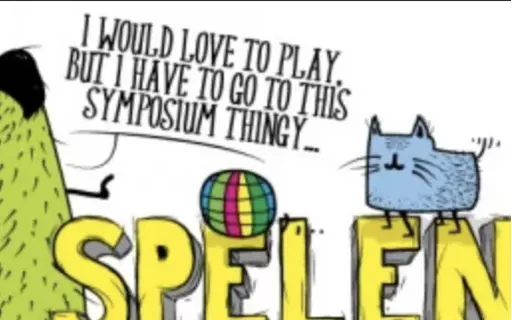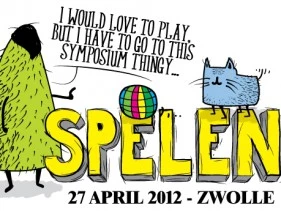
Homo Ludens
The one-day festival Play!, inspired by Huizinga’s ideas, explored the wide spectrum of play: from education to artistic and serious games, from the political to the erotic, and from improvisation to the realm of ‘make-believe’.
A selection of lectures and workshops from the event were recorded and can be viewed below. This one-day programme was part of a broader series curated by ArtEZ Studium Generale between 2011 and 2018, aimed at enriching critical reflection and interdisciplinary dialogue within ArtEZ. The full programme is available in the agenda item at the end of the page.
Video recordings
Van dit evenement zijn video-opnames gemaakt, zodat je de lezingen en workshops hieronder kunt bekijken. Het eendaagse evenement maakt deel uit van een reeks die ArtEZ Studium Generale tussen 2011 en 2018 programmeerde.
Lezing Tijs Goldschmidt : Spelen is doen alsof
Bioloog Tijs Goldsmidt gaf een lezing over de ernst van het spel waarin hij sprak over de biologische betekenis van spelen bij verschillende diersoorten, inclusief de mens.
Singer-songwriter Frank van der Geest
Als entr’acte tijdens het programma Homo Ludens speelt singer-songwriter Frank van der Geest Where is the Time?
René van Engelen van Dropstuff: Urban Screen-Based Games
René van Engelenburg is ontwerper en o.a. directeur van Dropstuff. Dropstuff.nl creëert samen met culturele partners immersieve kunstwerken en interactieve ervaringen in de openbare ruimte.
Christopher Dell: Improvisation as Technology
Christopher Dell (musician, improvisation theoretician) talks about whether improvisation could be the practice form that enables us to navigate through contemporary complexity. Dell’s ideas are relevant for music, architecture, city planning as for our daily lives in general.
Lezing Joost Raessens: Spelenderwijs – op weg naar een ludische mediacultuur
In zijn lezing vertelt Joost Raessens (mediatheoreticus) over de hedendaagse cultuur die zich karakteriseert door een proces van verspeelsing.
Lezing Martine Delfos: Homo ludens, homo virtualis
Het spel is van wezenlijk belang voor mensen, een voorwaarde zelfs voor de ontwikkeling van kinderen. Toch hebben we de neiging het minder serieus te nemen. Terecht? Doet spel iets met het brein? Wat betekent het voor de mogelijkheden die het virtuele milieu daarin biedt? Biopsycholoog Martine Delfos onderzoekt de ontplooiing van kinderen binnen deze nieuwe leefwereld.
Arjan Ederveen geïnterviewd door Raoul Heertje
‘Spelen houdt mij van de straat.’ Raoul Heertje interviewt acteur en auteur Arjan Ederveen over het plezier en de noodzaak van spelen.
Willem de Ridder: Fluxus – het Leven een Spel
‘Mijn uitgangspunt is dat het niet mag ontaarden in WERK. Als ik helemaal geïnspireerd opga in het spelen, speelt iedereen mee. We zijn EEN. Zodra het moeite kost, voelt iedereen de moeite. Brrr.’
Meesterverteller, radiomaker en Fluxuskunstenaar Willem de Ridder vertelt uitgebreid over de eerste internationale multimedia-beweging Fluxus, die vijftig jaar geleden ontstond en die een grote invloed heeft gehad op de manier waarop er nu met media wordt omgegaan.
agenda
Play!
Play! Event on the actual meaning of play in art, science and society.
27 apr. 2012Zwolle
